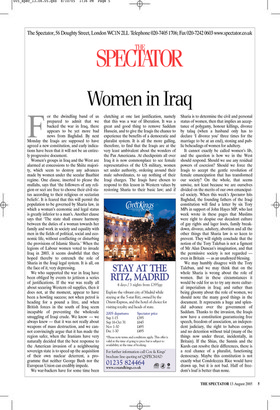Women in Iraq
For the dwindling band of us prepared to admit that we backed the war in Iraq, there appears to be yet more bad news from Baghdad. By next Monday the Iraqis are supposed to have agreed a new constitution, and early indications have been that it will not be an entirely progressive document.
Women’s groups in Iraq and the West are alarmed at concessions to the Shiite majority, which seem to destroy any advances made by women under the secular Baathist regime. One clause, inserted to please the mullahs, says that ‘the followers of any religion or sect are free to choose their civil status according to their religious or sectarian beliefs’. It is feared that this will permit the population to be governed by Sharia law, in which a woman’s economic and legal status is greatly inferior to a man’s. Another clause says that ‘The state shall ensure harmony between the duties of a woman towards her family and work in society and equality with men in the fields of political, social and economic life, without conflicting or disturbing the provisions of Islamic Sharia.’ When the legions of Labour women voted to invade Iraq in 2003, it seems doubtful that they hoped thereby to entrench the role of Sharia in the Iraqi legal system. It is all, on the face of it, very depressing.
We who supported the war in Iraq have been obliged by events to jettison a series of justifications. If the war was really all about securing Western oil supplies, then it does not, at the moment, appear to have been a howling success; not when petrol is heading for a pound a litre, and when British forces in the south of Iraq seem incapable of preventing the wholesale smuggling of Iraqi crude. We know — we always knew — that it was not really about weapons of mass destruction, and we cannot convincingly argue that it has made the region safer, when the Iranians have very naturally decided that the best response to the American invasion of a neighbouring sovereign state is to speed up the acquisition of their own nuclear deterrent, a programme that neither George Bush nor the European Union can credibly impede.
We war-backers have for some time been clutching at one last justification, namely that this was a war of liberation. It was a great and good thing to remove Saddam Hussein, and to give the Iraqis the chance to experience the benefits of a democratic and pluralist system. It is all the more galling, therefore, to find that the Iraqis are at the very least ambivalent about the wonders of the Pax Americana. At checkpoints all over Iraq it is now commonplace to see female representatives of the US military, women set under authority, ordering around their male subordinates, to say nothing of their Iraqi charges. The Iraqis have chosen to respond to this lesson in Western values by restoring Sharia to their basic law; and if Sharia is to determine the civil and personal status of women, then that implies an acceptance of polygamy, honour killings, divorce by talaq (when a husband only has to declare ‘I divorce you’ three times for the marriage to be at an end), stoning and public beheadings of women for adultery.
It cannot exactly be called women’s lib, and the question is how we in the West should respond. Should we use any residual powers of coercion? Should we force the Iraqis to accept the gentle revolution of female emancipation that has transformed our society? On the whole, that seems unwise, not least because we are ourselves divided on the merits of our own emancipated society. When this week’s Spectator hits Baghdad, the founding fathers of the Iraqi constitution will find a letter by six Tory MPs in support of John Hayes MP, who last week wrote in these pages that Muslims were right to despise our decadent culture of gay rights and lager louts, family breakdown, divorce, adultery, abortion and all the other things that Sharia law is so keen to prevent. They will rightly conclude that the notion of the Tory Taleban is not a figment of Mr Alan Duncan’s imagination, and that the permissive society is not regarded even in Britain — as an unalloyed blessing.
We may humbly disagree with the Tory Taleban, and we may think that on the whole Sharia is wrong about the role of women. But in these circumstances it would be odd for us to try any more cultural imperialism in Iraq; and rather than being gloomy about the role of women, we should note the many good things in the document. It represents a huge and splendid advance over the government of Saddam. Thanks to the invasion, the Iraqis now have a constitution guaranteeing free speech, freedom of association, an independent judiciary, the right to habeas corpus and no detention without trial (many of the things now under threat, incidentally, in Britain). If the Shias, the Sunnis and the Kurds can resolve their differences, there is a real chance of a pluralist, functioning democracy. Maybe this constitution is not exactly what Condoleezza Rice would have drawn up, but it is not bad. Half of freedom’s loaf is better than none.











































 Previous page
Previous page